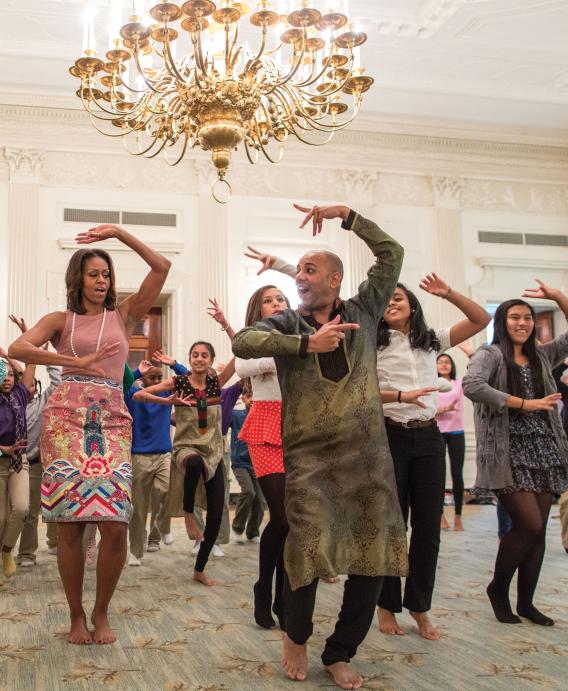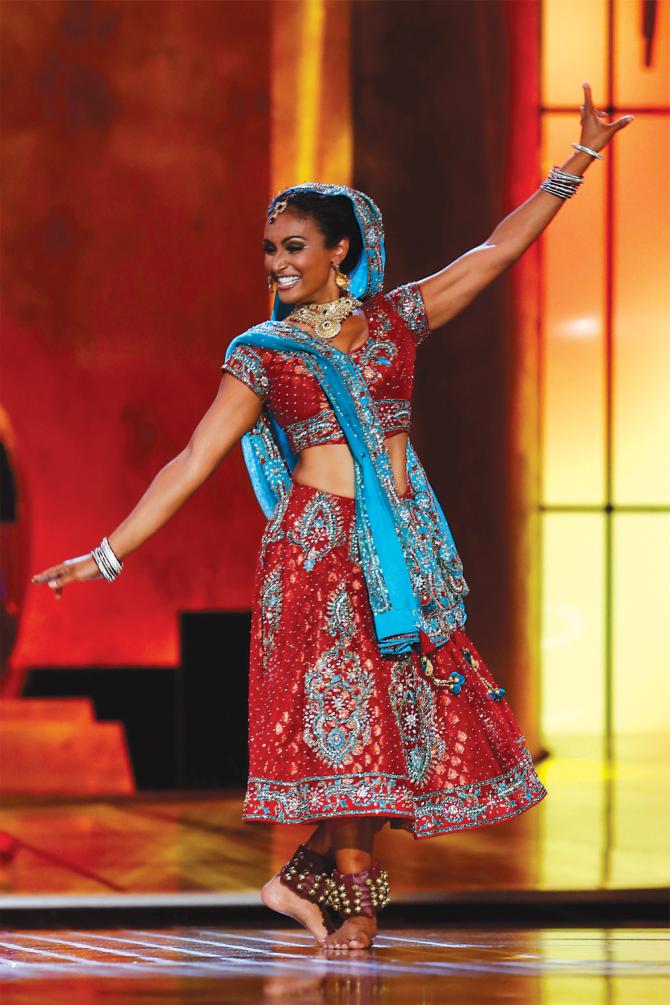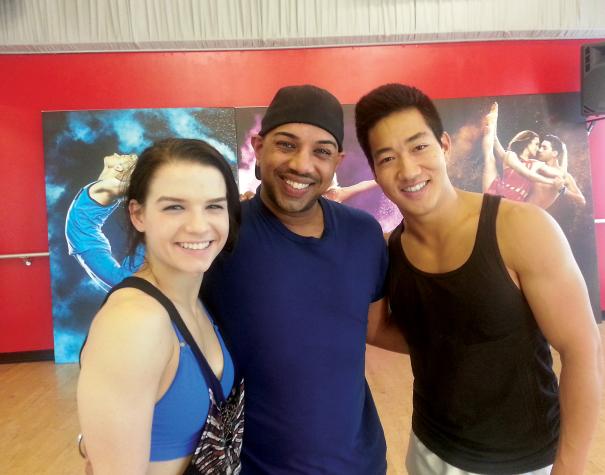Chaya Babu
From battling cancer to making Michelle Obama and Miss America Nina Davuluri groove to Bollywood tunes, Nakul Dev Mahajan has had a whirlwind year. Chaya Babu finds out more
A year ago, Nakul Dev Mahajan was facing the reality of testicular cancer. He was in chemotherapy, doing a nine-week programme to kill the disease.
He spent his time resting, trying to appreciate small things in life.
He had to remind himself to take it easy and focus on his health. But that meant turning down a lot of great opportunities or passing them off to others -- a tough decision for someone whose work is his life.
Today, he is cancer free, and has completed two of his most noteworthy gigs -- Mahajan choreographed the talent competition dance routine, which helped Nina Davuluri win the Miss America crown and appeared alongside First Lady Michelle Obama to teach Indian dance moves at the White House Diwali celebration.
“I think the universe is very mysterious and rewards you in ways you can’t put in words,” he says. “It’s amasing that Nina and the White House gig happened within the anniversary of when I realised how sick I was. I see it as the prize at the end of the rainbow for being able to fight the disease.”
Mahajan, a professional Bollywood dance choreographer, has gained fame for bringing upbeat dance numbers, featured only in Hindi films till now, to American audiences through prime-time television.
In 2008, he was invited to choreograph for FOX’s reality dance show So You Think You Can Dance.
Mahajan explains that this was even before Slumdog Millionaire came out and the Jai Ho craze hit clubs across America.
At the time, he says he didn’t know if it was going to turn into anything more than creating a few dances for one season of a television show. But he couldn’t have been more wrong.
“I think Bollywood has become gigantic,” Mahajan says. “America has really embraced Bollywood culture. When I started, it was trending, from America’s Next Top Model to a lot of small reality shows.”
He adds that he’s happy that Bollywood has become a big phenomenon in America now.
“It’s shocking, but a lot of non-South Asians who couldn’t even find India on the map are all of a sudden trying to learn more about the place.”
Mahajan, 38, has been dancing since he was a kid.
'I really struggled for many years to live the dream of wanting to dance'
Image: Nakul Mahajan choreographed Nina Davuluri's Bollywood dance routine for the Miss America pageant.He grew up in Los Angeles as the younger of two siblings. His older sister introduced him to the beats of the late 1980s and early 1990s and American pop idols like Michael and Janet Jackson and Paula Abdul.
Mahajan watched old Bollywood blockbusters and mimicked the movements he saw on screen behind the closed doors of his room.
This was a part of his upbringing, as was Bhangra, his parents being Punjabi immigrants whose culture was reflected in their home through film and music.
Mahajan’s father Mahesh came to the United States in the 1960s, on a scholarship to the University of California Berkeley and ended up working as an engineer for Xerox.
His mother Renu was a homemaker, but now works at Mahajan’s company, an unexpected move considering his parents’ attitudes about his passion when he was growing up.
“I think for any young South Asian boy to say, ‘I want to dance,’ was shocking for parents and they couldn’t accept it,” he says. “I think most desi parents want their kids, or their boys at least, to go into sports and study to become doctors and engineers.”
Mahajan recalls that his parents too had different dreams for him. “But I had this feeling that it wasn’t for me, that it wasn’t in my destiny. So I really struggled for many years to live the dream of wanting to dance.”
But at the same time he had cultural and community pressures. “I wasn’t great at school and I was that kid who got picked last for kickball and didn’t know how to shoot a basket. I was the black sheep,” he says.
This is a common story for young Indian Americans who break the mould of what their parents think reflects the American Dream.
Mahajan says he experienced a range of conflicting and difficult emotions and felt he wasn’t doing the right thing.
He didn’t fit in with his peers as the young people in his extended family were all on their way to medical or law schools.
Mahajan says that dancing was frowned upon as an ambition. And he even got into trouble for it at home.
His mother did not encourage his passion in the beginning.
“At about 7 or 8 years old, he used to dance in his room, and whenever I saw it, I told him that his studies were more important than dancing,” Renu recalls. “We’re from India, and there, they think that boys are not supposed to dance to all this Bollywood stuff, so I used to try to deter him. But then when I saw him on stage for the first time, I realised, no, he has a lot of talent. But I still always pushed him to put his studies first. Later he could make it into something professional.”
Now she can’t stop gushing about her son’s success.
“With every step he has taken, including So You Think You Can Dance and other projects, every time has been a proud moment,” she says. “When we got this news that he was going to Washington to teach dance to the First Lady, we didn’t even know what to say. It was such a good feeling. It’s a big moment for all Indians whenever there’s a face in the White House. And that was Nakul.”
Mahajan says he was aware in the beginning that his parents didn’t want him to make a career out of dance.
“My mom feels bad about this now, but she acted as if it was something to be ashamed of,” he says. “It’s fantastic if boys and girls take up dance now. But back then it wasn’t.”
Things turned around in high school, when the organisers of a local Diwali show approached Mahajan to perform at the function. They had seen him dancing socially at Indian parties and asked if he would be interested in doing a number.
It was 1989 and Mahajan was just 14, but this was a pivotal moment for him. He put together a Bollywood dance routine infused with contemporary moves inspired by Paula Abdul. The end result changed his parents’ views of his hobby.
Mahajan says he remembers that in the car ride home, his father had tears in his eyes and he told him, ‘I never knew how good you were. I knew you liked to dance but I didn’t know you were so talented.’
From that moment on, his parents fully supported him. They even suggested lessons. Mahajan’s first formal training was in Kathak. His parents promised to help him follow his dreams in the long run if he kept his grades up and got a bachelor’s degree.
Throughout the rest of his time in high school, he continued to perform in various spaces, making a name for himself as the Bollywood guy.
He created a unique style by mixing classical Indian and contemporary Western movements. At the time, this was an entirely new form and Mahajan says he was the only one doing it.
He graduated from University of California Riverside, where he learned a plethora of dance styles from around the world. His father kept his word and helped him start the Nakul Dev Mahajan Bollywood Dance Academy in 2003.
'... but we should support people who maybe haven't got there yet, and we should nurture their talents'
Image: With So You Think You Can Dance Season 10 contestants Alex Wong and Amy Yakima.Mahajan stresses the importance of parental support to kids who take classes at his school.
His goal is to create a warm, encouraging, familial environment, and much of this comes from his history of feeling like he didn’t have the blessing or support that he needed in the early years of pursuing his passion.
Mahajan says his talent was recognised by his peers only after he achieved a certain level of conventional success -- mainly, getting on network television.
“For me when that big break happened, I had people who had made fun of me previously give me the thumbs up,” he says. “But I was never even really happy with that because I felt that they should have been proud of me the second that I said, ‘I have a dream.’ Not because I made it.”
He adds, “Not everybody makes it. There are millions of talented children and artists out there who may not ‘make it,’ and what does that mean? That we’re not going to be proud of them? I’m happy that I got my break and I’m lucky that I did, but we should support people who maybe haven’t got there yet, and we should nurture their talents.”
It’s clear that Mahajan not only wants to bring Bollywood to people, but also wants to carry his good fortune forward and help young people of all backgrounds learn Bollywood dance in an atmosphere that he didn’t have as a child.
“I’m not saying that India is defined by Bollywood -- because it has millions of things besides that -- but it has still helped us to be placed somewhere in the world. I think dance does that,” Mahajan says.
He looks back on difficult times and remembers lying in bed, thinking ‘why it was happening to me?’
“But I tried to keep perspective and know how blessed I have been. And as of February, I’m cancer free. So I went through a whirlwind,” he says. “But when I think about what I went through I feel today that I’m a different person. And I definitely plan to keep going on with this dream.”




Comment
article